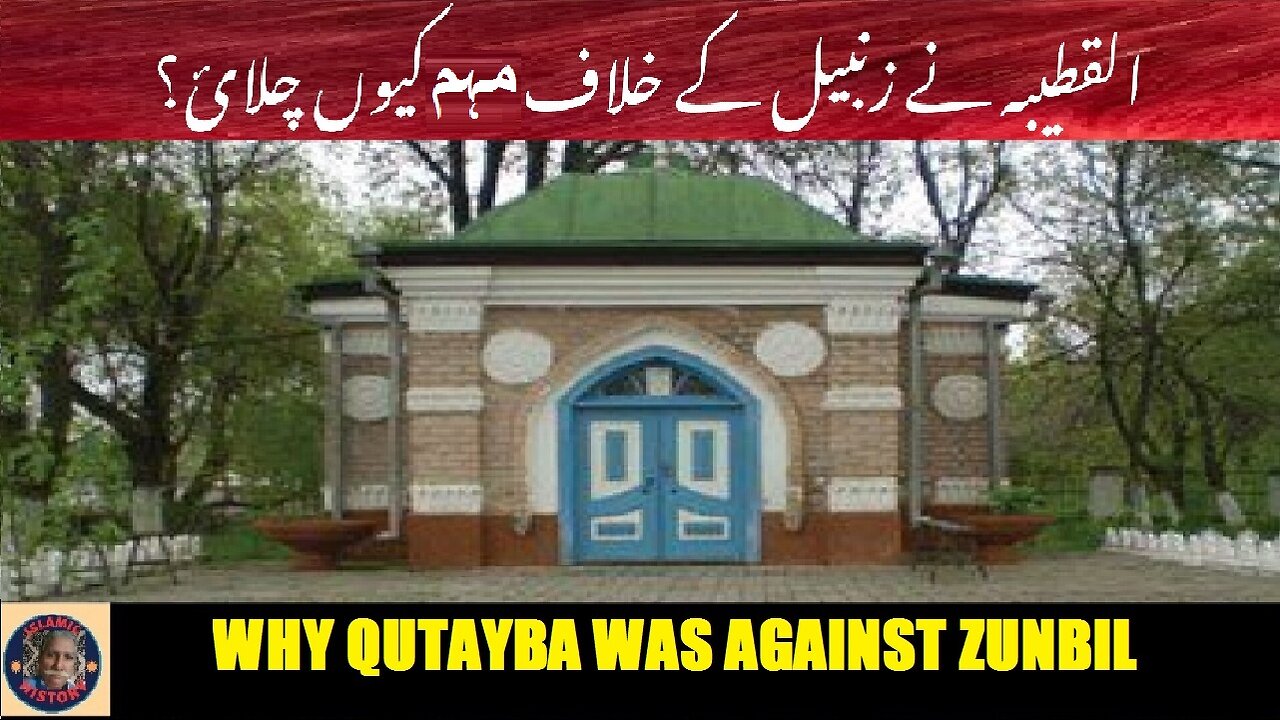Premium Only Content

Why Qutayba did Campaign against the Zunbil قطیبہ نے زنبیل کے خلاف مہم کیوں چلائی؟
@islamichistory813 #HistoryUnveiled #MilitaryCampaigns #CulturalConflicts
Why Qutayba did Campaign against the Zunbil
Dekhti Aankhooon aur sountay kaanoon ko Asslamoalaikum, sisters, brothers friends and elders, In this insightful video, we are describing the historical context surrounding Qutayba's military campaign against the Zunbil. We are describing the motivations behind this significant conflict, examining the political, economic, and cultural factors that influenced Qutayba's decisions. Please be with us and watch complete video as we are describing the complexities of this encounter and its implications for the region's history.
Later in 711, al-Hajjaj ordered Qutayba to march against the Hephthalite kingdom of Zabulistan, whose rulers, referred to by their title, Zunbil, had long remained an indomitable thorn in the Arabs' side and menaced their province of Sistan. Repeated expeditions against the Zunbil had failed, and a truce had been agreed in exchange for tribute. In addition, the existence of a free Zabulite kingdom was a threat to the security of Muslim control over the Hephthalite principalities of Tokharistan, who might be encouraged to seek support from it. Thus Qutayba led a large army south, but the Zunbil readily offered his submission and the payment of tribute. Satisfied with this easy success, and unwilling to hazard a campaign in the mountains of Zabulistan, Qutayba departed. No garrisons were installed, and after the Arab army departed, the Zunbil ceased the payment of tribute.
Qutayba's victories, parallel with the conquests of Muhammad ibn al-Qasim in northwestern India, awoke such enthusiasm and hopes among the Muslims that al-Hajjaj is reputed to have offered the governorship of China to whoever of the two first reached it.
Taking advantage of Qutayba's absence in the south, the inhabitants of Samarkand overthrew their ruler Tarkhun due to his passive stance towards the Arabs, and installed the prince Ghurak in his stead. As Qutayba prepared to march against Samarkand during the winter of 711/712, he received envoys from the king of Khwarizm (the Khwarizmshah).
Khwarizm had been previously subdued in the mid-690s by Umayya ibn Abdallah, but as soon as his forces departed, the Khwarizmshah had renounced the treaty, and subsequent efforts by Yazid ibn al-Muhallab against Khwarizm had failed. The Khwarizmshah, whose name is given as Jigan or Chigan by Bal'ami, faced a rebellion by his younger brother Khurrazadh and a powerful rival, the king of Khamjird, and asked Qutayba for help, offering recognition of the Caliphate's suzerainty, money, livestock and the payment of tribute in exchange. Qutayba, after announcing that he would head for Sogdia, advanced with his troops in a lightning campaign to the Khwarizmian capital Hazarasp. His brother Abd al-Rahman defeated and killed Khamjird's troops in battle and took 4,000 prisoners, who were then executed. Khurrazadh and his followers were also captured and executed. The Khwarizmians however rebelled shortly after Qutayba's departure and killed the Khwarizmshah. Qutayba replaced the governor, Iyas ibn Abdallah ibn Amr, with his own brother Abdallah ibn Muslim, but the revolt persisted until, after the capture of Samarkand, a strong force under al-Mughir ibn Abdallah could be sent to subdue the region. The local Afrighid dynasty was left in place, with Askajamuk II, the son of Azkajwar II, as the new Khwarizmshah, but the conquest of Khwarizm was accompanied by great brutality: the 11th-century Khwarizmian scholar al-Biruni compares the events with a barbarian sack, as the Arabs proceeded to massacre most of the upper classes who had fomented the revolt, and destroyed a great many objects of Khwarizmian culture, including manuscripts.
After leaving Khwarizm, Qutayba initially turned towards Merv, for his army had grown weary and demanded an end to the campaign. During the march, however, Qutayba suddenly turned the army around towards Samarkand. The Sogdians had disbanded most of their forces, and the Arabs, reinforced with levies from Bukhara and Khwarizm, were able to brush aside the local resistance and advance straight to the city itself and lay siege to it. Ghurak and the inhabitants of the city resisted the Arabs with determination, and called upon the rulers of Shash and the Ferghana Valley for aid. The ruler of Shash indeed sent a strong army to aid them, but it was ambushed and destroyed by the Arabs. The news of this arrived at the time where the Arab siege weapons had effected a breach in the city walls, forcing Ghurak to sue for peace. Qutayba initially granted surprisingly lenient terms: the payment of an annual tribute and the provision of an auxiliary corps as with Bukhara and Khwarizm, as well as the construction of a mosque inside the city and the celebration of prayers there by the Arab army. Once inside the city however, Qutayba proceeded to occupy and garrison it. One of his brothers (accounts differ between Abd al-Rahman and Abdallah) was left as governor, and orders were given prohibiting any non-Muslim access to the city citadel. Ghurak and his retinue left the city and founded a new town, Farankath, further to the north. This treachery enabled Qutayba to bring most of Transoxiana under his (albeit tentative) control, but it also considerably tarnished his prestige among the Sogdians.
Arab sources indicate that at about his time, the Sogdian princes called upon the Turkic Khaganate or the Türgesh for help against the Arabs, although the chronology and veracity of these accounts is open to question. At any rate, over the next two years Qutayba engaged in an effort to push the Caliphate's borders further and gain control of the Jaxartes valley. A large force, supported by some 20,000 Transoxianian levies, marched into the valley in early 713. The native levies were dispatched against Shash, which was reportedly taken, while Qutayba with the Arabs marched in the direction of Khujand and Ferghana. Little is known of these expeditions, although successful battles are recorded before Khujand and at Minak in Ushrusana, and the dispatch of an Arab embassy to the Chinese court is verified by Chinese sources. Al-Tabari reports that Qutayba marched into Chinese-held territory up to Kashgar, but this claim is dismissed by modern scholars. In 714, Qutayba renewed his expeditions along the Jaxartes, probably with Shash as his base, but his campaign was cut short upon receiving the news of the death of al-Hajjaj. Unsure of his position now that his patron was gone, he disbanded the army and returned to Merv.
So sisters brothers friends and elders, tomorow we are going to described Why did Qutabyba rebellion and happen aftermath of his death.. Allah hafiz
==================================
-
 3:07
3:07
ISLAMIC HISTORY
9 hours agoHadith Nabwi Sahih Al-Bukhari Hadith No. 9 صحیح البخاری حدیث نمبر Ilm aur Noor ki Raah
7 -
 UPCOMING
UPCOMING
The Shannon Joy Show
1 hour agoWTF? Technofascist Trump Tells UN He Will Launch A Global AI ID System. Guest: Derrick Broze!
1251 -

Benny Johnson
2 hours agoBREAKING: Left-Wing Terrorist Attack at ICE Facility, Sniper Opens Fire | Kimmel Sobs in Non-Apology
43K55 -
 LIVE
LIVE
The Big Mig™
3 hours agoTrump, Chuck Schumer & Hakeem Jeffries Can Go Pound Sand!
6,039 watching -
 1:09:27
1:09:27
The Kevin Trudeau Show Limitless
2 hours agoHow Energy, Mindset, And Marketing Really Work: Kevin Trudeau Reveals All!
5.9K1 -
 1:35:46
1:35:46
Dear America
3 hours agoGoogle ADMITS CENSORING Under Biden!! WE WERE RIGHT!! + The UN Sabotaged Trump!!
118K63 -
 LIVE
LIVE
Badlands Media
9 hours agoBadlands Daily: September 24, 2025
3,286 watching -
 2:15:08
2:15:08
Matt Kohrs
11 hours agoMarket Open: Bounce or Breakdown? LIVE Trading & Breaking News
27.6K1 -
 2:59:15
2:59:15
Wendy Bell Radio
7 hours agoThe Left Lies About Everything
55.7K99 -
 1:59:31
1:59:31
FusedAegisTV
11 hours agoTGS 2025 Capcom Online Special Program REACTION 9.24.2025 | FusedAegis Presents
10.9K